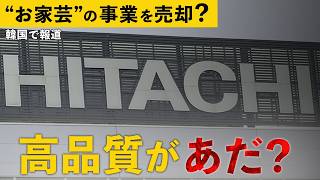By Hitachi Global Life
Copyright newsonjapan

Hitachi is reportedly weighing the sale of its home appliance division, which includes refrigerators, washing machines, and microwave ovens. The business is operated by Hitachi Global Life Solutions, and the move is part of broader structural reforms aimed at concentrating resources on higher-margin infrastructure sectors such as power systems and railways.
According to South Korean daily Maeil Business Newspaper, companies including Samsung Electronics and LG Electronics have expressed interest in acquiring the division. Both Korean firms, widely recognized for televisions and digital appliances, are also expanding aggressively in white goods.
Hitachi’s domestic appliance sales have been overshadowed by foreign competitors in recent years. The company’s appliance unit posted sales of about 360 billion yen in the fiscal year ending March 2025, less than 4 percent of the Hitachi group’s overall revenue of 9.78 trillion yen. For consumers, appliances have long served as an important point of brand recognition, but for the company as a whole, the division has become relatively small.
One paradox is that Japan’s strength in producing durable, high-quality appliances has also limited replacement demand. Washing machines and refrigerators often last 10 to 15 years, meaning fewer opportunities for repeat purchases. Unlike subscription-based services, white goods are typically sold once, generating little recurring revenue.
Hitachi has been shifting focus toward digital services under its Lumada brand, which can generate stable, ongoing income, unlike one-off appliance sales. In 2020, Hitachi had already transferred 60 percent of its overseas appliance business to Turkish manufacturer Arçelik, signaling a gradual withdrawal from the sector.
Competitive pressures have also eroded Japan’s position. Chinese players such as Haier and Midea have expanded through acquisitions, gaining market share with low-priced products. Domestically, Hitachi and Panasonic attempted to maintain competitiveness by introducing a system that allows manufacturers to set fixed retail prices, ensuring stable margins for both makers and retailers. While beneficial in theory, the policy has been difficult to communicate to consumers accustomed to bargaining for discounts.
The broader challenge is that further functional differentiation in appliances has become limited. With most products already highly advanced—washing machines now even automate detergent use—manufacturers struggle to offer features that justify premium pricing.
Source: Kyodo



